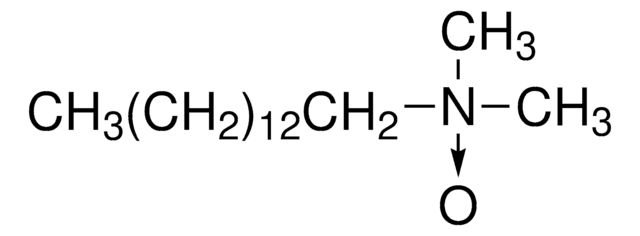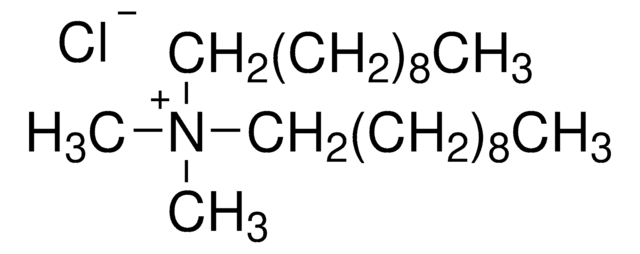40103
N,N-Dimethyldecylamine N-oxide
≥99.0% (NT)
Synonym(s):
1-Decanamine, N,N-dimethyl-, N-oxide, N,N-dimethyldecan-1-amine oxide, DDAO
About This Item
Recommended Products
description
non-ionic
Quality Level
Assay
≥99.0% (NT)
form
powder
mol wt
201.35 g/mol
impurities
≤0.03% peroxides (as H2O2)
anion traces
sulfate (SO42-): ≤50 mg/kg
cation traces
Ca: ≤500 mg/kg
Cd: ≤5 mg/kg
Co: ≤5 mg/kg
Cr: ≤5 mg/kg
Cu: ≤5 mg/kg
Fe: ≤5 mg/kg
K: ≤50 mg/kg
Mg: ≤50 mg/kg
Mn: ≤5 mg/kg
Ni: ≤5 mg/kg
Pb: ≤5 mg/kg
Zn: ≤5 mg/kg
storage temp.
2-8°C
SMILES string
CCCCCCCCCC[N+](C)(C)[O-]
InChI
1S/C12H27NO/c1-4-5-6-7-8-9-10-11-12-13(2,3)14/h4-12H2,1-3H3
InChI key
ZRKZFNZPJKEWPC-UHFFFAOYSA-N
Related Categories
General description
Application
Signal Word
Warning
Hazard Statements
Precautionary Statements
Hazard Classifications
Eye Irrit. 2 - Skin Irrit. 2 - STOT SE 3
Target Organs
Respiratory system
Storage Class Code
11 - Combustible Solids
WGK
WGK 3
Flash Point(F)
Not applicable
Flash Point(C)
Not applicable
Personal Protective Equipment
Regulatory Listings
Regulatory Listings are mainly provided for chemical products. Only limited information can be provided here for non-chemical products. No entry means none of the components are listed. It is the user’s obligation to ensure the safe and legal use of the product.
JAN Code
40103-5G-F:
40103-VAR-F:
40103-1G-F:
40103-BULK-F:
Choose from one of the most recent versions:
Already Own This Product?
Find documentation for the products that you have recently purchased in the Document Library.
Customers Also Viewed
Our team of scientists has experience in all areas of research including Life Science, Material Science, Chemical Synthesis, Chromatography, Analytical and many others.
Contact Technical Service










